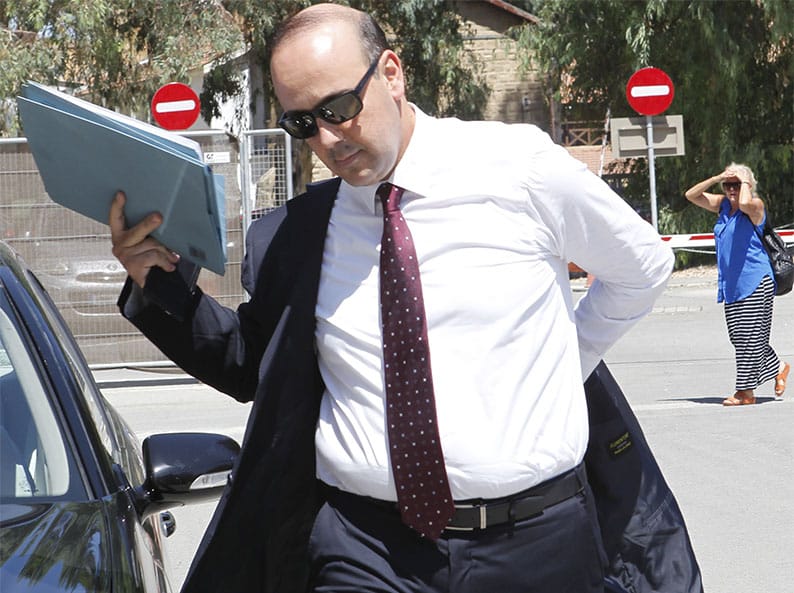
By Angelos Anastasiou
A legislative amendment proposed by the House interior committee to reduce sewerage fees in the Paphos and Nicosia municipalities was arbitrary and did not take into account the sewerage boards’ real needs, Paphos mayor Phedonas Phedonos said in a statement.
According to the relevant law, sewerage fees are levied by municipalities in order to cover the cost of building the sewerage network, meaning the cost of borrowing and any required work to expand the network.
The House committee decided to propose the reduction of the rates on property values used in calculating sewerage fees in order to meet the legal requirement of fiscal neutrality, meaning municipalities cannot receive more in rates than the cost of building the sewerage system.
For the first time this year, fees were calculated on property values revised in 2013 by the Land Registry, instead of the 1980 values used thus far, resulting in complaints of dramatically increased fees by some, while others saw their fees reduced.
“Based on the fiscal neutrality rule, the Paphos Sewerage Board (Sapa) decided to levy fees of €9.59 million, of which it estimated it would receive €8.5 million,” Phedonos said.
“This amount would cover the annual borrowing cost, which is approximately €8.6 million, plus the cost of various minor expansions of the network, which was some €0.5 million, for a total €9.1 million. The ultimate goal was for the budget to be fully balanced in 2018.”
But the committee’s proposal would reinstate the fees imposed in 2016, which was €8,44 million, “of which actual receipts would be €7.5 million at best”, Phedonos charged.
“It is obvious that in this way Sapa is led to deficits that will inevitably be rolled over to the public in the coming years,” he said.
“With regard to these consequences parliament did not take Sapa’s views into consideration and was not at all interested in asking what the deficit to be created was and how it will be covered.”
Phedonos added that the increase in fees for 2017 is owed to the fact that large-plot owners and land developers are forced to pay based on the revised 2013 values.
“For decades, these businessmen omitted recording what their plots contained and what developments they had undertaken in them, thus avoiding the ensuing taxation,” the mayor charged.
“And this, of course, at the expense of law-abiding citizens who met their obligations without fail.”
Therefore, he added, one reasonably asks what the rationale is behind rewarding those who failed to meet their obligations.
“Why are they proposing now, two months before the [presidential] election, to reduce the fees? And why did they not have an opinion when asked about the fees of 2018? Is it because there are no elections in November next year?”
Phedonos’ outburst prompted a surprisingly blunt statement by ruling Disy, the party to which the mayor belongs.
Disy spokesman Prodromos Prodromos said that “those who seek raises in sewerage fees can forget about it”.
“Regarding sewerage fees, let us state the facts clearly,” he said.
“Number one: the revision of property values from 1980 base values to the 2013 values was not done so that various sewerage boards or mayors can charge as they please. It was not done so that one city can charge 30 per cent more and another 18 per cent more.”
Number two, Prodromou said, the policy is that the 2013-base charges will be fiscally neutral, meaning they will serve to create the same revenues as before, and the sole goal is the fairer distribution of this total.
“Therefore, those who want to impose higher fees are simply off-topic,” he said.
Meanwhile, saewerage rates in Limassol will see a five per cent reduction per year starting in 2018 until 2022, Mayor Nicos Nicolaides said, and there will also be smaller adjustments to usage fees as a percentage of water consumption starting in 2019.
Speaking at a news conference, the mayor said sensible management in previous years enabled the Limassol sewerage board to start reducing rates gradually, ultimately aiming at easing the financial burden of the residents.
The reductions, according to the mayor, will reach 25 per cent in the coming years.
Nicolaides also announced that the second phase of the network — which started in 2006 — extending main and secondary pipelines and upgrading the most important infrastructure of the system to cover the broader Limassol area, was almost complete.
New waste management projects will approach completion in 2022, six years later than planned because of additional work and the economic crisis.
Priority is placed on extending the rainwater drainage system in a bid to resolve the flooding experienced by residents in certain areas.
The new projects are expected to cost over €28.5m, the mayor said. To date, it has spent over €44.5m in projects relating to rainwater drainage.
The post Paphos mayor slams cut in sewerage fees, Limassol to slash its levy appeared first on Cyprus Mail.